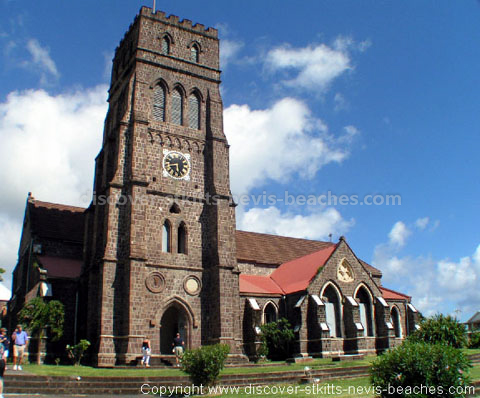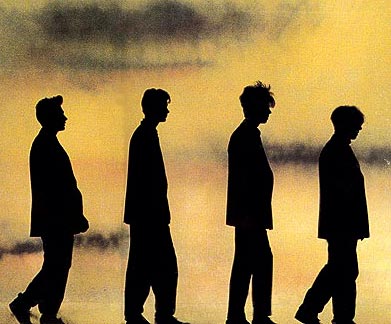Crisis in the Episcopal Church

American Episcopalians Being Torn Apart Over Homosexual Issue
Episcopal parishes in Va. break away
By MATTHEW BARAKAT, Associated Press Writer
FAIRFAX, Va. - Two of the most prominent and largest Episcopal parishes in Virginia voted overwhelmingly Sunday to leave The Episcopal Church and join fellow Anglican conservatives forming a rival denomination in the U.S.
;
Truro Church in Fairfax and The Falls Church in Falls Church plan to place themselves under the leadership of Anglican Archbishop Peter Akinola of Nigeria, who has called the growing acceptance of gay relationships a "satanic attack" on the church.
Truro rector Martyn Minns was consecrated a bishop by the Church of Nigeria earlier this year to lead Akinola's Convocation of Anglicans in North America.
"This has been our spiritual home, so separating is very hard," Minns said at a news conference announcing the parishes' decision. "There's also the promise of a new day. A burden is being lifted. There are new possibilities breaking through."
Virginia Bishop Peter Lee, a centrist, had won praise even from his critics for his extensive outreach to all sides in the conflict. He said Sunday that the votes "had compromised these discussions and have created Nigerian congregations occupying Episcopal churches."
Four other small Virginia parishes have also left, six more voted to break away Sunday and two more will decide soon whether to follow suit, according to parish leaders.
None is as eminent as Truro and Falls Church, however. The parishes together claim more than 4,000 members, with roots they trace back to Colonial times.
A lengthy and expensive legal fight could erupt over the Truro and Falls Church properties, which are worth millions of dollars.
"We fully intend to assert the church's canonical and legal rights over these properties," Lee said in a news release, calling it a "sad day for the church." Losing all the conservative churches could cost the Virginia diocese around 10 percent of its 90,000 members.
The Episcopal Church, the U.S. wing of the global Anglican Communion, has been under pressure from traditionalists at home and abroad since the 2003 consecration of the first openly gay bishop, V. Gene Robinson of New Hampshire.
Under Anglican tradition, Akinola's move into Episcopal territory amounts to an invasion, since archbishops agree not to start churches outside the borders of their own region. Episcopal Presiding Bishop Katharine Jefferts Schori will consult with her advisers on how the denomination should respond, said Bob Williams, the national Episcopal spokesman.
While theological conservatives are a minority within the 2.2 million-member U.S. denomination, their protests have had an impact.
Ninety percent of Falls Church parishioners and 92 percent of Truro members who cast ballots in the last week supported cutting ties with The Episcopal Church, parish leaders said.
"It was a very, very emotional time," said Jim Oakes, Truro's top lay leader, who supported the split. "In some ways it's like a death in the family."
Nationally, Episcopal researchers estimate that at least one-third of the nearly 115,000 people who left the denomination from 2003 to 2005 did so because of parish conflicts over Robinson.
Seven of the 100 U.S. Episcopal dioceses have threatened to break from the denomination, but have so far stayed put. The closest any have come to leaving was a vote earlier this month in the Diocese of San Joaquin, in Fresno, Calif., endorsing a first step toward seceding. But that diocese must take a second vote next year before they can formalize a split.
The feud has been far more damaging to the 77 million-member Anglican Communion.
Most overseas Anglicans believe gay relationships violate Scripture and contend liberal interpretations of the Bible are far outside the bounds of mainstream Christian belief.
Struggling to hold the communion together, Archbishop of Canterbury Rowan Williams, the Anglican spiritual leader, has said that the communion may have to create a two-tier system of membership, with branches that ordain partnered gays given a lesser status.
Akinola is among the conservatives who aren't waiting for a negotiated solution.
In a statement Friday, Canon Kenneth Kearon, secretary general of the Anglican Communion, said that the archbishop of Canterbury has not "indicated any support" for the mission.
___
The 2003 consecration of the openly gay Bishop Gene Robinson of New Hampshire increased the concerns. At the request of the Anglican Communion's Lambeth Commission, ECUSA released To Set Our Hope on Christ on June 21, 2005, which explains "how a person living in a same gender union may be considered eligible to lead the flock of Christ."
The recent election of a woman as Presiding Bishop has been controversial within the church and the wider Anglican Communion. The ordination of women and of non-celibate homosexuals and the practice of blessing same-sex Holy Unions within many dioceses has caused criticism by conservatives within ECUSA and in the greater Anglican Communion. The American Anglican Council formed in 1996, and the Anglican Communion Network, formed in 2004, both resulted from concerns of conservative dioceses and parishes within the Episcopal Church.
Bishop Jefferts Schori voted to confirm Bishop Robinson and has allowed same-sex Holy Unions in her diocese of Nevada. Eight US bishops have rejected Jefferts Schori's authority and have requested alternative pastoral oversight; in one case, the convention of the diocese supports the bishop; the other seven have not yet considered it.
The recent election of a woman as Presiding Bishop has been controversial within the church and the wider Anglican Communion. The ordination of women and of non-celibate homosexuals and the practice of blessing same-sex Holy Unions within many dioceses has caused criticism by conservatives within ECUSA and in the greater Anglican Communion. The American Anglican Council formed in 1996, and the Anglican Communion Network, formed in 2004, both resulted from concerns of conservative dioceses and parishes within the Episcopal Church.
Bishop Jefferts Schori voted to confirm Bishop Robinson and has allowed same-sex Holy Unions in her diocese of Nevada. Eight US bishops have rejected Jefferts Schori's authority and have requested alternative pastoral oversight; in one case, the convention of the diocese supports the bishop; the other seven have not yet considered it.
On December 2 2006 the Convention of the Diocese of San Joaquin, one of the most conservative dioceses in the church, passed a series of resolutions which, if confirmed at the convention in 2007, set into motion withdrawal from the Episcopal Church and affiliation with another Anglican Church, "“The diocese shall be a constituent member of the Anglican Communion and in full communion with the See of Canterbury.” This was combined with a resolution which removed the present boundaries of the diocese, theoretically allowing it to absorb other dissident congregations in the United States. The small diocese has 48 parishes and 7,000 members but includes an active caucus which opposes secession


<< Home